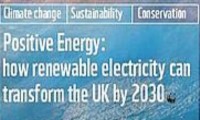Clean energy future can happen - says new report
 Renewable sources of energy could meet between 60-90% of the
Renewable sources of energy could meet between 60-90% of theUK’s electricity demand by 2030.
A new report by WWF
says that renewable sources of energy could meet between 60-90% of
the UK’s electricity demand by 2030, and recommends that the
government sets its target at no less than 60% for renewable energy
generation to provide certainty for investors.
The report, Positive Energy, found that with a strong focus on
renewable energy and energy efficiency, it is possible to largely
decarbonize the UK power sector and maintain system security
without resorting to new nuclear power.
A wide range of organizations have welcomed the report’s
contribution to the energy debate and supported many or all of its
recommendations. These include: Siemens; Unilever; Procter
& Gamble; National Grid; Crown Estate; SSE; Triodos Bank;
Renewable UK; Vestas; RSA; Renewable Energy Systems; Interface
Flor; and Ecotricity.
The report, based on modelling by GL Garrad Hassan (GL GH),
developed six scenarios for the UK’s electricity system in
2030.
The scenarios, which differ according to the level of
electricity demand and the use of different methods for providing
system security - ensuring that there is no risk of ‘the lights
going out’ - all achieve the near decarbonization of the power
sector by 2030, as recommended by the Committee on Climate Change
(CCC).
The report’s most ambitious scenarios show that renewables could
meet almost 90% of UK electricity demand by 2030. This would create
a springboard for the UK to become a net exporter of clean energy
to the rest of Europe.
“This report is inspiring, but also entirely realistic,” says
WWF chief executive, David Nussbaum.
“It shows that a clean, renewable energy future really is within
our grasp. If we seize this opportunity, it will lay the
foundations for a clean industrial revolution in the UK, with all
the jobs and export opportunities that brings, as well as being a
major step forward in tackling climate change.”
“Investing in clean energy therefore
offers us a means to tackle the two most crucial market failures
that now confront the world - the financial crisis and climate
change. The only question that remains is, are we bold enough to
take it?”
Energy efficiency & capital costs
The report also found that strong support for renewables now can
significantly reduce their costs in the future.
It concludes that a strong renewable energy target for 2030 and
stable financial support mechanisms are key to substantially
reducing the cost of renewable energy for the UK, building a strong
platform for investment and maximising employment opportunities
from this new
The report shows that ambitious action on energy efficiency
could reduce the capital costs of generation and interconnection by
up to £40bn by 2030 and that a concerted drive to reduce energy
demand in households has the potential to more than offset the
costs of meeting renewable energy goals.
Investor certainty critical
The report argues that the government needs to provide the level
of certainty for investors willing to make large-scale investment
in the UK renewables supply chain by making a greater long-term
commitment to a target of at least 60% renewables in the UK’s
energy mix by 2030.
There is a need for stable market
arrangements which provide long-term revenue certainty to reduce
risk and mobilise capital investment in
renewables.
David Nussbaum said: “Harnessing UK renewables potential will
help to reduce the volatility of UK consumer bills, as they won’t
be at the mercy of fossil fuel price fluctuations, which have
driven the majority of price rises in recent years. Examples from
other countries, as well as industry projections, show that
renewable energy could also create hundreds of thousands of jobs in
the UK.
“Failure to commit to a high-renewables future would leave us
facing the prospect of dangerous levels of climate change and high
energy prices. The opportunity offered by the clean energy
revolution is one that we cannot afford to miss.”
The report’s findings on the potential of renewable electricity
are far more ambitious than those put forward by the Committee on
Climate Change (CCC) in its Renewable Energy Review in May and by
several other studies by the Department of Energy and Climate
Change (DECC).
Read
target=”_blank”>’Positive Energy: how renewable electricity can
transform the UK by 2030’
Source: www.wwf.org.uk

